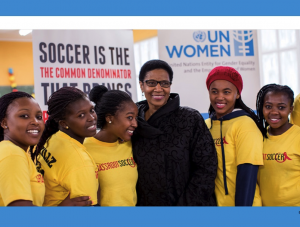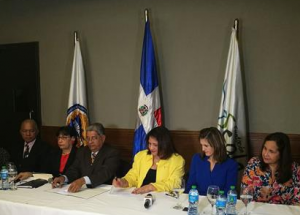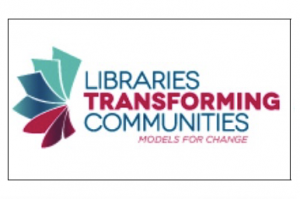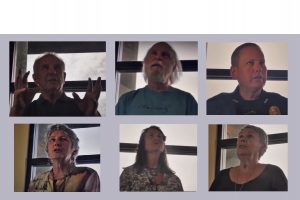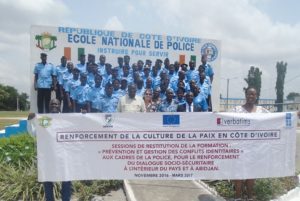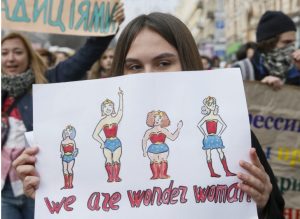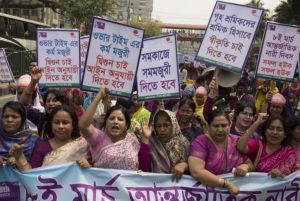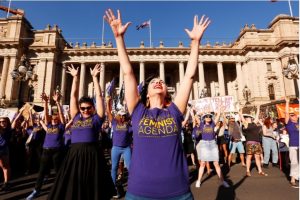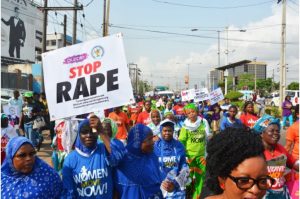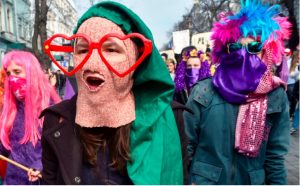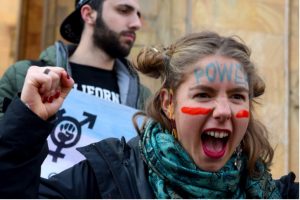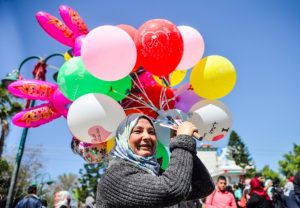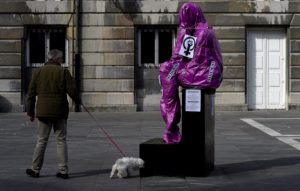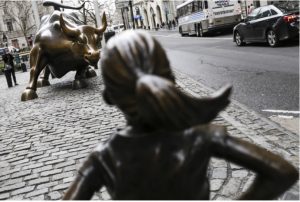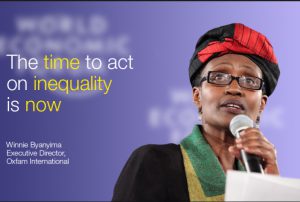. WOMEN’S EQUALITY .
Continuation of the Opening statement by Phumzile Mlambo-Ngcuka, UN Under-Secretary-General and Executive Director of UN Women for the 61st session of the Commission on the Status of Women as published by UN Women
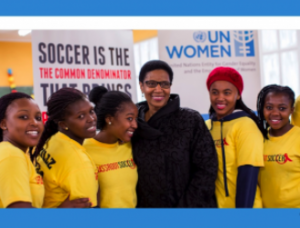
… There is a big opportunity for this Commission to recommend changes that match the ambitions of the Sustainable Development Goals in their scale of potential change. And when we do that we will address the needs of these women.
More than half of all women workers around the world—and up to 90 per cent in some countries—are informally employed. We cannot ignore them. This sector is just too big to fail.
Informal workers themselves are mobilizing to negotiate the changes they need, for example waste pickers through their local associations in Brazil, Colombia and India, and in many cases doing that successfully.
On International Women’s Day last week, Pakistan enacted a new law that recognizes home-based workers and entitles them to social protection.
Excellencies, let us look for a moment at some of the barriers that remain to be cracked.
There is under-representation of women in decision-making at all levels. They therefore have insufficient voice to drive the nature and extent of change needed.
There is still a myriad of laws in more than 150 countries that discriminate against women. This falls right in your court as decision-makers and law makers.
And we have to address the stereotypes, norms and practices that discriminate against women and girls, and have for generations denied women career paths on a par with men.
In this Commission, you have an opportunity to assist us to turn back these practices and to introduce changed practices both in businesses and in institutions. The global pay gap, at an average of 23 per cent, means that women are clearly earning consistently less than men.
Women regard this as daylight robbery. The deficit has robbed generations of women of income, future security and just reward. Each year they work three months more than men for equivalent pay.
In the digital age, we also seek technology-enabled solutions for women. We must therefore resolve to act on gaps in the access to technology that unfortunately have been growing. There are some 200 million fewer women online than men, and the gap is worryingly widening.
In a world that has moved to technology and will move even further, this obviously has to change for women too, as it is expected that 90 per cent of future jobs will need a level of digital literacy.
This Commission can drive faster change for multitudes of young people and older people who need to be ready for this future world of work.
Too few people are impacted by the actions to date that we have been driving in the economy.
Change is not yet addressing the root causes of women’s economic injustice, nor is it fulfilling their rights.
There is now an opportunity to act on the economic front. These changes must also mean a rights-based approach in which all people also enjoy democratic rights, free to organize, free to dissent, and human rights defenders free to support their fellow workers, fellow activists and not be killed and brutalized for doing this work. And young people must be free to be activists.
Advancing women’s equality in total could bring a potential boost of 28 trillion US dollars to global annual GDP by 2025. That is five years before the 2030 Agenda endpoint. Wouldn’t it be great if we were to achieve this?
Just fixing the informal economy could impact 80 per cent of the women working outside home in sub-Saharan Africa and remove the threat of extreme poverty.
The change of discriminatory laws in over 150 countries could affect more than 3 billion women and girls in the world. And that is what tipping the scale is about. This will be game changing.
Macroeconomic policies and related laws would contribute to inclusive growth and significantly accelerate progress.
Innovations in climate-smart agriculture and the low-carbon economy envisaged in the 2030 Agenda, as well as digital economies and information communications technologies can rapidly move opportunities ahead.
Mobile cellular networks already cover an area occupied by 95 per cent of the world’s population offering huge potential for digital and financial inclusion.
Investment in a pipeline of girls well educated in STEAM subjects [science, technology, engineering, arts and math], could increase the current 25 per cent of women in the digital industries’ workforce and build skills matches for the ‘new collar’ jobs of the Fourth Industrial Revolution coupled with the anticipated demands of the green economy.
(continued in right column)
(continued from left column)
Women also face difficulties when it comes to access to markets. Governments and the private sector can both make a significant contribution to this. If just 1 per cent more than existing annual global public procurement spending were to be directed to women’s enterprises, women could earn an additional 60-70 billion US dollars from supplying goods and services. This can be addressed in procurement policies and practices.
We have committed to eliminating violence against women including sexual harassment at work in the next 13 years by 2030.
That would give relief to many women who are traumatized by daily harassment at work. That includes the ability for women to have a fair hearing when they report violence and harassment at work.
Paid parental leave, more men sharing care work, and safe affordable childcare services together create many possibilities for more women to be active in the economy and enhance the essential parenting role of men.
The private sector has a role to play in this too, and in enabling women’s voices to be heard in shaping products, services and policies in the new industries, supporting asset ownership, digital and financial inclusion, and infrastructure development. When companies promote women, invest in their careers, and bring their voices into decision making, there is a better future for all.
Collectives like trade unions, and networks and associations like the International Domestic Workers Federation are vital, where the fight is not just for higher wages but for higher and equal wages. They are absolutely essential to ensuring that women are adequately represented to get the changes they want.
It is ever more urgent that we respect and protect women’s sexual and reproductive health and reproductive rights, and ensure the unmet needs of family planning for women are met. This would limit unwanted pregnancies and the consequences for mothers who may wish to work outside the home, and protect their rights .
Excellencies, what you agree to do during this CSW could be the much needed accelerator for the implementation and achievement of the 2030 Agenda. We must make, and can make, the world of work, work better for women, transforming economies and realizing rights.
We now have only 13 years until 2030. Every week and every month counts. So does the scale of the change we achieve, which must also benefit the displaced persons.
This Commission on the Status of Women must not be the Commission on the Status Quo.
This week the UN Secretary-General’s High-Level Panel on Women’s Economic Empowerment will present its final report. This contains important recommendations, all in line with the work of this Commission. The report will enable us to reach and motivate the partners who are essential for success.
At the UN, under the leadership of the Secretary-General, we are also making adjustments to support women in the world of work. We are committed to gender parity at senior levels by 2021. This is a challenge faced by many partners in both public and private sectors. Our Secretary-General joins the growing number of leaders who want a solution before 2030.
Incentives in every sector will be needed to recruit and retain female workers and also to make contributions to the business culture, and the norms and values that must change for women to realize economic justice.
Lessons from countries already making change are important to share. For this Commission, 35 countries have provided input on the review theme of how lessons from the Millennium Development Goals are being reflected in national processes and policies. We also expect progress on gender to be reflected in the reports for the July 2017 UN High-Level Political Forum. We also follow with interest the actions of countries that made critical commitments at the 2015 Global Leaders Meeting attended by more than 70 heads of state.
Partnerships are essential, especially our partnership with ILO that tonight will enable us to launch the forward-looking “Equal Pay Platform of Champions”, which will be attended by trade unions, by sports heroes, by film stars, governments and by youth.
Excellencies, we need to work together. There are challenges but there are also solutions. You have boldly committed to substantive and sustainable changes by 2030.
Across the world, civil society space is shrinking, and democratic actors and human rights defenders face daunting attacks. Strong movement building continues in the face of the existential threats that both provoke and besiege it.
We know that strong and autonomous women’s movements are a corollary of effective policy change on gender equality. We will consistently promote their safety and ability to organize.
At the same time, over the last two years, a resounding global gender equality compact has been accumulated, through the Beijing+20 Review, Agenda 2030 itself, the Paris Agreement on Climate Change, the New Urban Agenda and the New York Declaration on Migrants and Refugees.
These aspirations are shared by the world, for a better world; for women, for us all.
Thank you.
